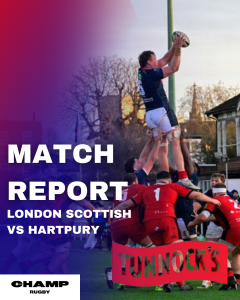
Dear London Scottish supporter
No doubt many of you will have read the newspaper reports and seen the comments from both the Rugby Football Union (RFU) and Championship Clubs Committee concerning the creation of a new ‘Tier 2’ for English rugby due to be launched in season 2025/26. The RFU Council approved resolutions for both the Premiership Game Partnership agreement (covering the Premiership league) and Tier 2 (covering the Championship) at its meeting on Friday 14th June. Copies of both RFU and Championship Clubs (CC) statements following the meeting are attached.
The LSIL Board met virtually on Friday to consider the implications of this agreement. We are grateful to the CC executive for the time and effort that has gone in to these protracted and at times difficult negotiations. We recognise that these are the first steps on the route to re-launch the league in 2025/26 and that there remains significant work still to do on many important details, including some which are central to the LSIL business model (eg Player Development Pathway).
There are 3 key features of the new Tier 2 structure which have been approved by Council:
1) Governance: RFU and CC will create a new Tier 2 Board, 3 RFU members, 3 CC members and one independent chair (who will also represent the clubs on the new Professional Rugby Board (PRB) being established by PRL and RFU as part of the Professional Game Agreement).
LSIL view: this is a welcome development for the launch and commercialisation of the new Tier 2. It provides a much needed element of autonomy and focus for the Tier 2 clubs in the early stages, enables them to develop a distinct commercial model, ensure appropriate operating standards and drive towards financial sustainability for the league. It is expected that once established, T2B would fold into the PRB to create a single unified governance structure for professional rugby in England.
2) Minimum Operating Standards (MOS): Council approved a substantial set of proposals, building on the current minimum operating standards already in place in the Championship (which each club signs up to as part of its annual participation agreement). These standards cover areas such as facilities (ground capacity, seating, floodlighting, media access etc), player welfare (coaching, strength and conditioning, medical, personal development), strategy, business model and financial oversight. Clubs are now required to complete an initial ‘self-validation process’ before the start of 2024/25 season, identifying areas for development against ‘Essential’ and ‘Aspirational’ standards for clubs operating in the league. The Tier 2 Board will oversee and approve clubs meeting of the MOS which will come into effect in season 2025/26.
LSIL view: We have reviewed the drafts and provided feedback to the CC as these proposals have been developed with the RFU. We will participate openly in the ‘self validation process’, working with Richmond Athletic Ground (RAG) to ensure appropriate plans are in place to rectify any shortfall vs ‘Essential’ standards and a pathway put in place to meet the ‘Aspirational’ standards over time. Funding, timing , and a progressive and collaborative approach (from Tier 2 Board and RFU) will be needed to enable clubs to achieve compliance. We welcome this element to the new league, raising standards and enabling ambitious clubs to develop the necessary infrastructure and operating capability to perform in the Premiership over time.
3) Competition Structure: Council approved a new 14 team league structure for Tier 2 starting in season 2025/26. Season 2024/25 will be a development season, giving clubs the opportunity to invest, develop a programme for MOS compliance, and establish a commercial platform for the league, without the threat of relegation compromising their investment. The team winning National One in 2024/25 will be promoted to the new Tier 2 with one other club joining in addition. This may (or may not) be the team finishing second in National One; the process for selection will be managed by the new Tier 2 Board and approved by RFU Council.
LSIL view: We welcome the clarity provided by this proposal which enables us to invest in the club through this formative season 2024/25 without the immediate risk of relegation (nb relegation and promotion ‘one up-one down’ will resume in 2025/26 and we fully support ‘open access’ through playing performance to the professional leagues). We will be promoting innovation over competition formats: a traditional home and away 26 game league programme (plus Premiership Cup) is a heavy fixture load for players which risks adding to the cost base for clubs and running contrary to the interests of player welfare.
Funding:
In addition to these three important features which were approved by RFU Council, the RFU Board has clarified its funding allocation for Tier 2. This will increase from £1.6m pa (paid direct to the clubs in 2022/23) to £4m pa starting in the ‘development season’ of 2024/25. Clubs will continue to receive £1.6m pa of direct ‘unconditional’ funding; the extra £2.4m will be earmarked for commercialisation (£1.4m central ticketing, marketing, commercial, media, sponsorship activity) and player development pathway (£1m). Allocation of these funds will be determined by the Tier 2 Board.
LSIL view: We welcome the increase in funding to the tier 2 league, but note the large divide between the Premiership and Championship, which will widen following the signing of the Professional Game Partnership between RFU and Premiership Rugby Limited. The funding is also significantly lower than in the last agreement with the Championship, before the imposition of two cuts, one as part of the RFU’s own cost cutting measures and the other in response to the Covid crisis. Low levels of central funding make it all the more important that the Tier 2 Board is successful in establishing its own commercial sources of funding through sponsors, partners, media and broadcast revenues. This must be a key focus of the Board in the development season to enable clubs to reach a position of greater financial sustainability.
Promotion/Relegation update:
An important part of the RFU/PRL negotiations with the CC executive was the challenge to the Premiership Minimum Operating Standards around ground capacity. These, along with the funding imbalance for the promoted and relegated club, act as a barrier to progression for Championship clubs and have ensured that in the very few cases of promotion/relegation, the relegated team from the Premiership has immediately recovered its position in the following season. As part of the new Professional Game Partnership which the RFU Council also approved last Friday, the capacity barrier has been reduced from 10,000 in year one, to a four year pathway of 5000, 7500, 7500, 10000. This is welcome news for ambitious clubs in the league, aspiring to progression to the Premiership.
LSIL view: we welcome the adjustment in the capacity threshold and the four year pathway for compliance with the 10,000 minimum standard. This will act as a spur to those clubs who have the capability to challenge for promotion and help the league deliver on one of its core objectives, to be a ‘club development’ platform for future Premiership clubs. Developing genuine contenders for promotion adds real value to the second tier of English rugby and the jeopardy of relegation via play off retains interest at the top and bottom of both leagues to the final day of the season. This is an important concession for Tier 2 clubs which has positive implications for the future of English club rugby. Discussions about the funding imbalance between promoted and relegated club will no doubt continue.
Final Comments:
After long and protracted talks, we welcome this agreement, which brings an important element of autonomy to the new Tier 2 in its early days, re-connects the second league to its Premiership partner and brings increased funding to the clubs who have carried a disproportionate share of the funding burden to develop players and clubs for the good of the English game for too many seasons of late. Obviously, we would have liked the funding to have been greater, but we move on; we can start to look forward and take control of the levers which will enable us to reach our goals of financial and playing stability in this tough league.
For a club like London Scottish, for whom in the medium term our primary focus must be on player development in the Championship, the absence of clarity on the Player Development pathway funding, due to start in 2025/26 is a source of concern. We will be focusing our discussion with the Tier 2 Board and the RFU on ensuring that this rewards and incentivises clubs who provide players with the much needed development game time that can be lost to them in academy or large senior squad set ups. This is especially true of u-20 players, where we are proud to have fielded 5 English and one Welsh u-20s 6 Nations internationals in the past season. We are excited to have renewed our partnership with Harlequins into a third season, to see the product in our improved on field performances in the league, the increasing number of players who progress from London Scottish ranks into regular first team squad selection for Harlequins, and the united squad culture and playing style which we have all bought into.
As a Board, we are aware of the value our supporter base places on our Scottish identity and history. We continue to explore opportunities with the SRU to play our part in the Player Development pathway for Scottish qualified players. We will resume these conversations immediately, once we know the identity the new CEO of the SRU and new Head of Professional Rugby. Clearly, this work falls outside the scope of our discussions with the RFU around Tier 2 and remains unaffected by it (subject to compliance with any player registration/movement Regulations).
The second tier of English rugby has two principal objectives; to develop clubs along the last stages of the pathway from amateur, participation and enjoyment goals through semi-professionalism and into full time professional businesses, with commercial and sporting entertainment interests at their core; and to develop players to progress along a similar pathway, moving through the club system to achieve their goals of becoming full time professional rugby players and ultimately England internationals. This agreement moves us forward in achieving these objectives; your Board will work tirelessly to ensure we continue to be a competitor (and partner) in this league.
Stephen Pearson
Chair London Scottish International Ltd
President London Scottish FC
You can find the Championship Club’s Committee Statement here.
You can find a link to the RFU Council Meeting Update here.



